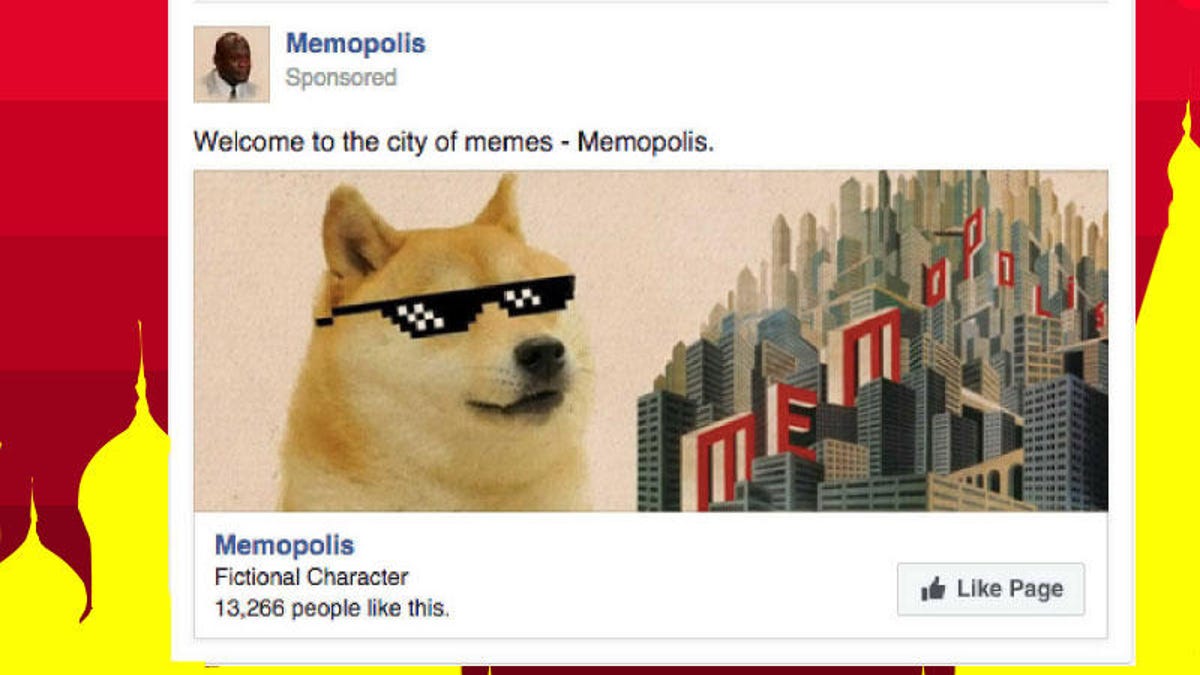Russian trolls targeted teens on Facebook with memes
From Russia, with memes.

The Memopolis page was run by the Internet Research Agency.
The Kremlin wants to say, "How do you do, fellow kids?"
Some of the thousands of posts from Russian trolls on Facebook came from an account called Memopolis -- a meme-focused page that tried its best to go viral among teens.
In an ad promoting the page, which had 13,266 followers, Russian trolls wrote: "Welcome to the city of memes - Memopolis." The sponsored content was targeted to people between the ages of 13 and 40, specifically those who had an interest in BuzzFeed or 9GAG, according to data provided by Facebook and the House Intelligence Committee.
The trolls spent 5,761.04 rubles on the ad, or $93.44.
Up to 19,164 people saw the post, and 1,042 of them clicked through to the page while it ran multiple times in June and July in 2016. That's just one small example.
Russian trolls spent just $100,000 for 3,000 Facebook ads, averaging out to about $33 a post. But the social media campaign went beyond sponsored posts, as trolls flooded Facebook with more than 80,000 posts between 2015 and 2017, catching the eyes of 126 million Americans. The ads, which Congress released on Thursday, show how memes played a prominent part in the Russian effort to manipulate public opinion.
The posts, created by Russia's Internet Research Agency, focused on divisive issues like gun control, the US presidential election and race relations.
The Memopolis page went after a younger, more impressionable crowd, using memes with pictures of SpongeBob SquarePants, Sesame Street characters and Pokemon Go. The page used jokes to pull in their target group, then slipped in propaganda disguised as memes.
Many of the posts viewed by CNET stayed out of politics, though Memopolis would pepper in content related to the election throughout its feed.
"It's about engagement. They grow these pages extremely large through funny memes because we all like a good laugh. At some point, they might be able to introduce stuff that's a little more targeted," said Jennifer Grygiel, a social media professor at Syracuse University.
In one post from June 23, 2016, Russian trolls put up a drawing of Cookie Monster from Sesame Street refusing to delete his cookies. The caption: "Cookie Monster and Hillary must be opposites," referring to emails deleted from the Democratic presidential candidate's servers.
The metadata on the released ads show that the IRA promoted that post several times throughout that summer.
The post got 8,978 views, and 1,207 people clicked on it. Russian trolls specifically aimed the ad at girls and women between the ages of 14 and 40, who showed interests in "Funny Photos, Funny Pictures, LOL or Funny Pics." It cost 700 rubles, or $11.35.
A meme posted about Hillary Clinton.
Another post from July 2016 showed a photo of Trump and Clinton on urinals. It was also targeted to people between the ages of 14 and 40. The ad cost $9.72 and reached 11,140 people.
Another meme posted on the page targeted toward teens.
"Ninety-nine percent of the content will be in line with norms, and then they slide in propaganda," Grygiel said. "They're cultivating a specific audience with their jokes, and sliding in a Hillary Clinton slight in there."
The memes often target teens too young to vote, perhaps indicating trolls' efforts to influence opinions over the long term.
The Atlantic Council's Digital Forensic Research Lab found that RT, a Kremlin-funded media outlet, owns a YouTube channel called "In the Now." It used popular viral content to gather a young audience, and like the Memopolis page, threw in political comments that reflected the Russian government's views. It has more than 3 million followers on Facebook, 22,000 followers on Instagram, 58,300 followers on Twitter and 48,000 followers on YouTube.
Former FBI agent claims Hillary Clinton stole State Dept furniture in recently released records pic.twitter.com/Mi1et75Re7
— IN THE NOW (@IntheNow_tweet) October 19, 2016
At the height of Pokemon Go's popularity, Russian trolls also paid Facebook to promote posts with memes about the mobile gaming app. Most of them were jokes, but the most popular post included a subtle jab at police -- another divisive political issue that Russian trolls zeroed in on.
The Pokemon Go themed meme wrote, "Pulls out a rock and throws it at the cop to try and capture the Pokemon. Gets arrested."
One of the many Pokemon Go memes posted on the account.
Russians spent $8 on the post. It received 9,900 views in return and saw 2,549 people click on it. The ad was also aimed toward people between the ages of 14 and 40. Pokemon Go has long been a part of Russia's propaganda game, with CNN reporting last October that Russian trolls used the popular app to promote anti-police brutality campaigns.
"It's worked extremely well," said Michael Pachter, a Wedbush analyst. "Think of these guys as social media marketers who are trying to determine what works and what doesn't, and use that to target better."
iHate: CNET looks at how intolerance is taking over the internet.
Life, Disrupted: In Europe, millions of refugees are still searching for a safe place to settle. Tech should be part of the solution. But is it?

